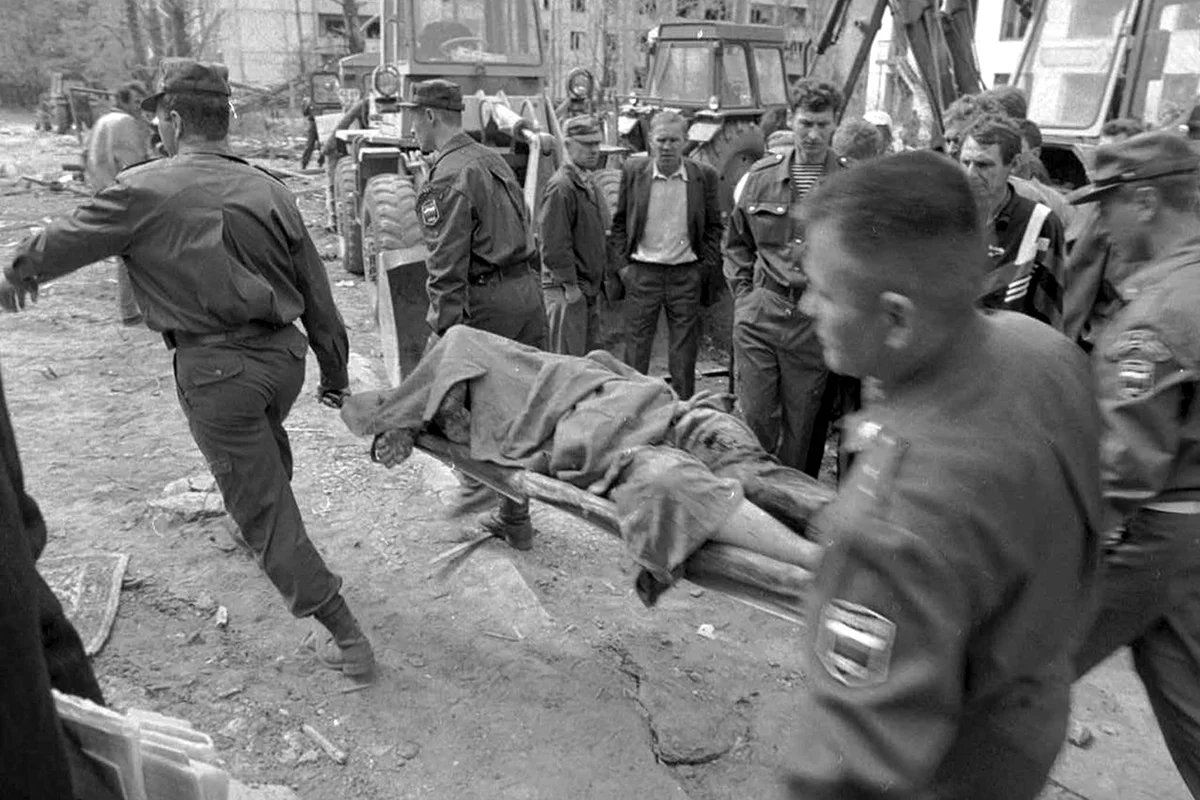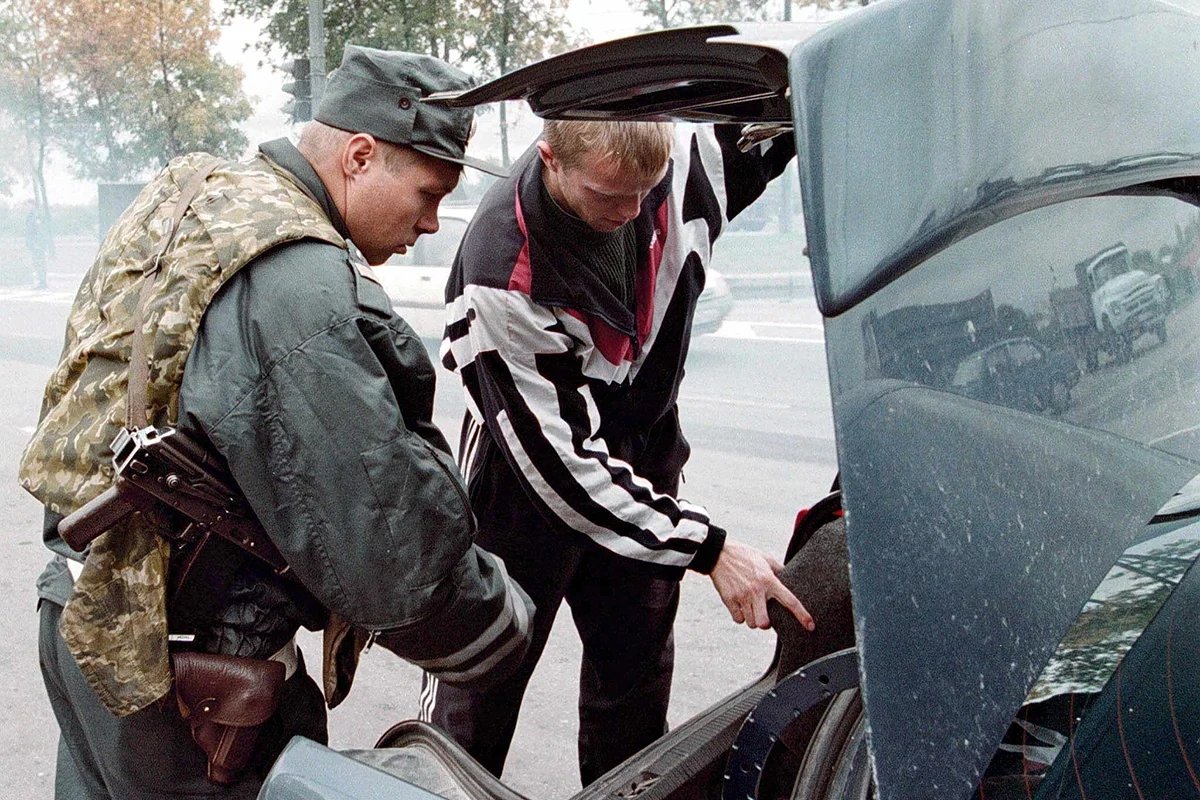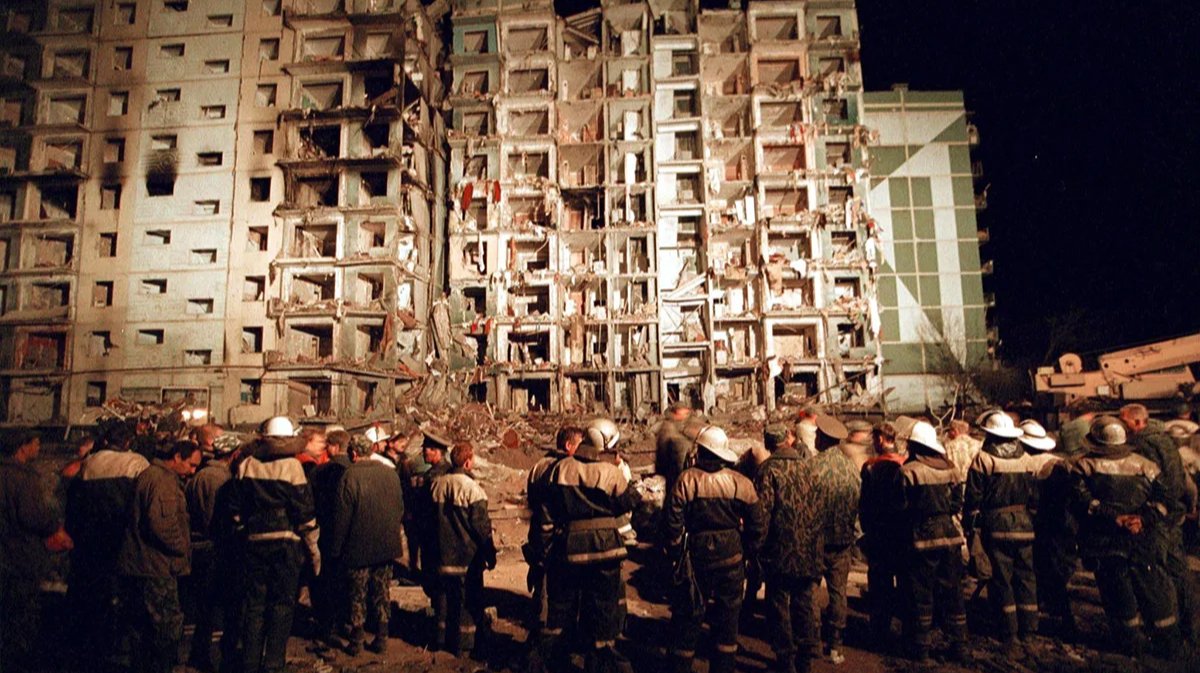In the immediate aftermath of the terror attack on Moscow’s Crocus City Hall, Russians on social media recalled the infamous Ryazan sugar incident, the 1999 discovery of three sacks of explosive in the basement of an apartment building in the central Russian city of Ryazan at a time of national paranoia about terrorism.
In the days leading up to the Ryazan discovery, a series of bombings had occurred in apartment buildings in Moscow, Dagestan in the North Caucasus, and the southern Rostov region, in which a total of over 300 people were killed and another 200 were injured. The entire country lived in fear, not knowing which building might be targeted next.
By contrast, nobody died in Ryazan, but the events that unfolded there form their own chapter of this story, as they first gave rise to the theory that the Federal Security Service (FSB) was behind the apartment bombings.
While many continue to dismiss this as a conspiracy theory, an increasing number of people believe it should be taken seriously. In either case, the incident in Ryazan remains shrouded in mystery and independent investigators are still attempting to get to the bottom of it to this day.
Sugar or RDX?
On 22 September 1999, Ryazan resident Alexey Kartofelnikov noticed three men dragging sacks out of a van and into the basement of his apartment building. The vehicle’s number plate was partially obscured and the regional code appeared to have been added by hand.
Kartofelnikov called the police, who upon arrival 40 minutes later, found three 60-kilogramme sacks in the basement that contained a substance resembling sugar. A timer and three batteries with wires were also found in the bag. The device was set to go off at 5:30am.
Residents of the building were immediately evacuated to a nearby cinema. Witnesses recall that a bedridden elderly woman was forced to remain in the building as her daughter was unable to find anyone to help evacuate her.
Specialists tested the substance in the sacks and concluded that it was Research Department Explosive (RDX) — a highly explosive substance in white crystal powder form, though it reportedly did not detonate during an explosives test. The sacks were subsequently sent to Moscow “for precise analysis”.
The police then announced a dragnet operation. A manhunt began for the three men Kartofelnikov had spotted and their empty van was soon found abandoned 90 kilometres away in the Moscow region city of Kolomna.
Interior Minister Vladimir Rushailo, who also headed the ministry’s anti-terrorist commission, announced at a meeting on combating organised crime two days later, that a terrorist attack in Ryazan had been successfully averted.
But half an hour later, the then-FSB director Nikolay Patrushev, who had been sitting next to Rushailo when he made his statement, contradicted him. “The incident in Ryazan wasn’t a bombing, or the prevention of a bombing. It was a training exercise. The sacks contained sugar, not explosives. These exercises aren’t just being held in Ryazan. I believe that training exercises should resemble real-life situations, because otherwise we’ll never find anything and never be able to respond properly,” Patrushev told Nikolay Nikolayev on pro-Kremlin channel NTV.
In his film about the terrorist attacks on his YouTube channel Redaktsiya, Nikolayev recalled receiving a call from Rushailo’s press secretary shortly afterwards, telling him that Rushailo was “hysterical” in the face of such “a total shock and a terrible humiliation.”

Rescuers carrying a victim of the car bomb which destroyed a residential building in Volgodonsk in the early morning of 16 September 1999. Photo: EPA PHOTO EPA/ITAR-TASS/VK
Terrorists or chekists?
On 4 October 1999, Novaya Gazeta reported that the Ryazan department of the FSB had given a reward to Alexey Kartofelnikov, as well as to an employee of the local phone company, Nadezhda Yukhanova, who reported a conversation between the suspects.
“I was doing my job. I overheard a suspicious conversation in a call to Moscow: ‘Come alone, there are checkpoints everywhere’,” said Yukhanova.
“The most intriguing thing about this investigation is that when the operatives ran the numbers, they realised they belonged to the FSB’s own telephone exchange,” recalled Alexey Frolov, who worked for Novaya Gazeta in Ryazan at the time, in an interview with Russian TV journalist Alexey Pivovarov. “They gave the order to stand down, but our operatives still made the arrests. But the men who got arrested were sent to Moscow, as they unexpectedly turned out to be colleagues.”
In 2000, the NTV current affairs programme Independent Investigation, hosted by Nikolayev, brought together residents of the building in Ryazan and FSB agents, who attempted to convince them that the incident had been nothing more than a training exercise. The officers even brought a suitcase full of evidence, but refused to reveal the contents without their superiors’ permission. Nikolayev called their arguments “extremely weak”.
Berezovsky’s theory
Blowing up Russia, a book co-authored by émigré historian Yury Felshtinsky and Alexander Litvinenko, a former FSB officer who had specialised in tackling organised crime, was published in the US in 2002. It was bankrolled by oligarch Boris Berezovsky, who by that time had fallen out of favour with Russian President Vladimir Putin and moved to London.
The book claimed that the bombings were carried out by the FSB in order to justify the invasion of Chechnya and the launch of the Second Chechen War. This theory was also widely promoted by Berezovsky. However, the book was severely criticised for its superficiality and bias.
Litvinenko died after being poisoned with polonium in London in 2006. A British court concluded that he had been murdered in a special FSB operation approved by both Patrushev and Putin.

A police officer examining the boot of a car on the road to St. Petersburg, 16 September 1999, following a series of terrorist attacks in Russia. Photo: Anatoly Maltsev/EPA PHOTO/VK
‘What was the point of all this?’
In Nikolayev’s film, former Novaya Gazeta editor-in-chief Dmitry Muratov asks: “What was the point of all this? Why hold these training exercises, if they were really exercises? Why blow up a building on Novoselov Street, when the country was already living in fear? I don’t have answers. I can guess. But how can you prove it?”
Valentin Gefter, a member of an independent commission investigating the apartment building bombings, believes that the incident in Ryazan had one simple aim. “The idea was to discover the explosives at the last minute and save the residents of the building, to show that in this case, unlike in Moscow and Volgodonsk, the FSB was vigilant and capable of averting a terrorist attack, while still blaming it all on terrorists from the North Caucasus.”
Nikolayev admitted that while he didn’t initially believe that the FSB could have been involved, “after Crimea, after Donetsk, after the Skripals, after Navalny, after Malaysia Airlines Flight 17”, he was more inclined to accept that this was the most likely explanation.
Sergey Smirnov, the editor-in-chief of independent news outlet Mediazona, said on YouTube in September 2022, “I find it very alarming that when we discuss the 1999 bombings, any suggestion that the FSB may have been involved is for some reason labelled a conspiracy theory. … Rational logic shows this really was preparation for a terrorist attack.”
Smirnov believes that the apartment bombings were part of a plan to consolidate Putin’s power and to replace the ailing Boris Yeltsin. “Instead of questioning the wisdom of starting another war in the Caucasus, people became focused on the need to ‘crush the vermin, to wipe them out’,” says Smirnov.
Roman Badanin, the editor of independent investigative journalism outlet Proekt, wrote on Facebook on 24 February 2022: “I promise the Russian president that one day I will prove, or someone else will, that he was responsible for the apartment building bombings in 1999. I don’t doubt this for a second.”
Join us in rebuilding Novaya Gazeta Europe
The Russian government has banned independent media. We were forced to leave our country in order to keep doing our job, telling our readers about what is going on Russia, Ukraine and Europe.
We will continue fighting against warfare and dictatorship. We believe that freedom of speech is the most efficient antidote against tyranny. Support us financially to help us fight for peace and freedom.
By clicking the Support button, you agree to the processing of your personal data.
To cancel a regular donation, please write to [email protected]

